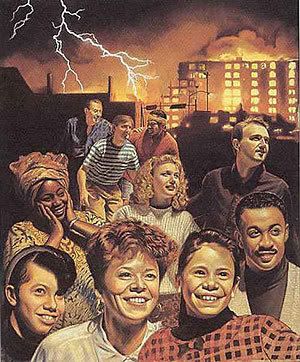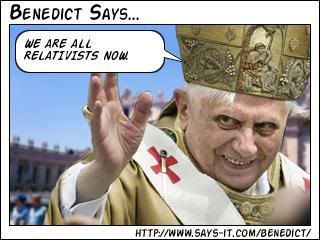Things I wish I'd said to the Jehovah's Witness last Saturday morning
No--nothing nasty. But while the Telstra salespersons are bound to receive short shrift when they come rapping, gently rapping at my front door of a Saturday morning, I've been less reluctant of late to engage the visiting Jehovah's Witness(es) in conversation. I don't know why--perhaps I feel a little emboldened now that we atheists finally have our groove back.
Just this past Saturday I was greeted by an amiable old gentleman (they're always old--why is that?) whose opening gambit involved a reflection of the troubled state of the world--as compared to the halcyon days of yore--and how all the crime, wars, disasters and suffering surely signal the end times. (Quick note--Jehovah's Witnesses never, ever tell you which religious organisation they're representing.) I said that as bad as things might seem, I didn't think they were significantly worse today than in previous eras--the perception that they are so is largely media driven--in response to which he insisted that, statistically speaking, they were bad, even taking into account the increase in population. Not having the laptop on me at the time to be able to investigate his claims, I left the matter alone. (What I should have said is that while bygone days might have been kind to nostalgic middle-class white Westerners, they were certainly far from kind to many others--and I wonder what an African-American who lived in the segregation era in the Deep South might have made of my visitor's "we're all rooned" thesis.)
Anyway, the subject of discussion then moved on to Bible prophecy. Did you know that the Book of Daniel accurately predicted World War One? I could check my Bible, he suggested (despite my telling him that I'm an atheist, he still assumed I'd have a Bible in my possession. I mean--who wouldn't?), to verify. But apparently Daniel says that WWI would happen a certain span of years calculated forward from the destruction of Jerusalem in 607 BCE--a date which the man at the door assured me had been agreed upon by archaeologists and historians. And if the Bible could accurately predict events like WWI, my interlocutor reasoned, might it not be similarly relied upon to predict other events, like, say, the end of the world?
Now here's where a little background reading on the beliefs of the Jehovah's Witnesses would have assisted me. You see, according to Religious Tolerance.org, Jehovah's Witnesses--including, I assume, the man knocking on my door on Saturday morning--believe that Armageddon will involve God exterminating 99% of humanity, sparing only "active members in good standing of the Jehovah's Witnesses." Furthermore, until quite recently the church believed it could pinpoint the year in which the end of the world as we know it (as the REM song goes) would transpire. And it turns out that the original date--the date calculated by founder Charles Taze Russell--was 1914, a.k.a. the start of World War One. How did he do it? Here's how:
So my friend had not been entirely forthcoming. According to Russell's rather ad hoc method of calculation, Daniel had not predicted WWI, he had predicted the end of the world as we know it--and he was wrong! "Out of curiosity," I asked cheekily, "when is the end of the world?" "Ah, well," he muttered, flicking through his Bible to Matthew 24:35-36, which says "Heaven and earth shall pass away, but my words shall not pass away. But of that day and hour knoweth no man, no, not the angels of heaven, but my Father only." How convenient. Since 1996, official church policy has been to leave the date unspecified. The man at the door offered to come back and discuss it further, but I politely declined.
I wish I'd asked him one thing, though. Supposing that the Bible accurately predicted WWI, does this mean that Gavrilo Princip ought not to have been held morally culpable for the murder of the Archduke of Austria-Hungary, given that his actions were part of a divine plan? (That is, if Princip had been aware of the prophecy identified by the Jehovah's Witnesses, would he have been able, according to their theology, to have chosen not to shoot the Archduke, and so render the prophecy untrue?) Should the Sept. 11 hijackers similarly be held blameless, since their actions presumably help to fulfil the end-time prophecy? Were these agents free to choose otherwise, or weren't they? Indeed, what is the point of doing anything to redress the problems of the world if these problems are but the signs that the end of the world is nigh?
In short, it's a pretty bleak (not to mention ludicrous) theology. Colour me unimpressed (and unconverted ;)).
Just this past Saturday I was greeted by an amiable old gentleman (they're always old--why is that?) whose opening gambit involved a reflection of the troubled state of the world--as compared to the halcyon days of yore--and how all the crime, wars, disasters and suffering surely signal the end times. (Quick note--Jehovah's Witnesses never, ever tell you which religious organisation they're representing.) I said that as bad as things might seem, I didn't think they were significantly worse today than in previous eras--the perception that they are so is largely media driven--in response to which he insisted that, statistically speaking, they were bad, even taking into account the increase in population. Not having the laptop on me at the time to be able to investigate his claims, I left the matter alone. (What I should have said is that while bygone days might have been kind to nostalgic middle-class white Westerners, they were certainly far from kind to many others--and I wonder what an African-American who lived in the segregation era in the Deep South might have made of my visitor's "we're all rooned" thesis.)
Anyway, the subject of discussion then moved on to Bible prophecy. Did you know that the Book of Daniel accurately predicted World War One? I could check my Bible, he suggested (despite my telling him that I'm an atheist, he still assumed I'd have a Bible in my possession. I mean--who wouldn't?), to verify. But apparently Daniel says that WWI would happen a certain span of years calculated forward from the destruction of Jerusalem in 607 BCE--a date which the man at the door assured me had been agreed upon by archaeologists and historians. And if the Bible could accurately predict events like WWI, my interlocutor reasoned, might it not be similarly relied upon to predict other events, like, say, the end of the world?
Now here's where a little background reading on the beliefs of the Jehovah's Witnesses would have assisted me. You see, according to Religious Tolerance.org, Jehovah's Witnesses--including, I assume, the man knocking on my door on Saturday morning--believe that Armageddon will involve God exterminating 99% of humanity, sparing only "active members in good standing of the Jehovah's Witnesses." Furthermore, until quite recently the church believed it could pinpoint the year in which the end of the world as we know it (as the REM song goes) would transpire. And it turns out that the original date--the date calculated by founder Charles Taze Russell--was 1914, a.k.a. the start of World War One. How did he do it? Here's how:
A key component to the calculation was derived from the book of Daniel, Chapter 4. The book refers to "seven times". He interpreted each "time" as equal to 360 days, giving a total of 2,520 days. He further interpreted this as representing exactly 2,520 years, measured from the starting date of 607 BCE. This resulted in the year 1914-OCT being the target date for the Millennium. 20 Russell's belief became a key teaching of the Jehovah's Witnesses (Watchtower Bible and Tract Society). Since late in the 19th century, they had taught that the "battle of the Great Day of God Almighty" (Armageddon) would happen in that year.Granted, WWI was a devastating series of conflicts, but the world kicked on (as it would do through the far more devastating WWII). There was a lot of egg on a lot of faces. Since then, 1918, 1925, 1932, 1941, 1966, 1975 and 1994 have all been candidates for this maddeningly elusive Armageddon.
So my friend had not been entirely forthcoming. According to Russell's rather ad hoc method of calculation, Daniel had not predicted WWI, he had predicted the end of the world as we know it--and he was wrong! "Out of curiosity," I asked cheekily, "when is the end of the world?" "Ah, well," he muttered, flicking through his Bible to Matthew 24:35-36, which says "Heaven and earth shall pass away, but my words shall not pass away. But of that day and hour knoweth no man, no, not the angels of heaven, but my Father only." How convenient. Since 1996, official church policy has been to leave the date unspecified. The man at the door offered to come back and discuss it further, but I politely declined.
I wish I'd asked him one thing, though. Supposing that the Bible accurately predicted WWI, does this mean that Gavrilo Princip ought not to have been held morally culpable for the murder of the Archduke of Austria-Hungary, given that his actions were part of a divine plan? (That is, if Princip had been aware of the prophecy identified by the Jehovah's Witnesses, would he have been able, according to their theology, to have chosen not to shoot the Archduke, and so render the prophecy untrue?) Should the Sept. 11 hijackers similarly be held blameless, since their actions presumably help to fulfil the end-time prophecy? Were these agents free to choose otherwise, or weren't they? Indeed, what is the point of doing anything to redress the problems of the world if these problems are but the signs that the end of the world is nigh?
In short, it's a pretty bleak (not to mention ludicrous) theology. Colour me unimpressed (and unconverted ;)).


















|